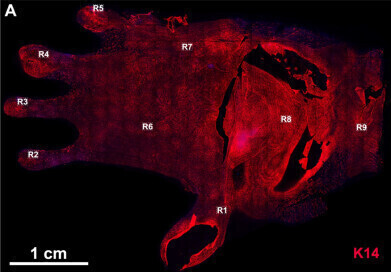-
 Engineering edgeless human skin with enhanced biomechanical properties.
Engineering edgeless human skin with enhanced biomechanical properties.
Research News
Pioneering frontiers: A year in review of ground-breaking life science research
Dec 08 2023
Exploring the frontiers of science with AMSBIO
In a recent blog post, AMSBIO reflects on the innovative life science and biomedical research conducted by its customers throughout 2023. From unravelling the complexities of cancer progression mechanisms to transforming wound care, AMSBIO proudly acknowledges its role in supporting these scientific endeavours.
One notable collaboration led by Dr Ashley M. Laughney from Weill Cornell Medicine and Dr Samuel F. Bakhoum from Memorial Sloan Kettering Cancer Center delved into the intricate mechanisms driving cancer metastasis. Their research unveiled the intricate interplay between chromosomal instability and the immune system, shedding light on the chronic activation of the cGAS–STING pathway and its contribution to creating a pro-metastatic tumour microenvironment. Using CAG-Luciferase lentiviral particles from AMSBIO in mouse models of breast cancer, the researchers monitored metastatic progression through bioluminescence. This ground-breaking research marks a significant step toward advancing cancer therapies, offering valuable insights into potential interventions for melanoma, breast, and colorectal cancers.
Professor Peter K. Sorger's research group at Harvard Medical School showcased the efficacy of spatial biology in identifying visual cancer biomarkers compared to traditional histology techniques. Utilising the 'Orion' platform, which enables the collection of H&E and high-plex immunofluorescence images for cancer diagnosis, the study used FFPE tonsil and lung adenocarcinoma tissue from AMSBIO's extensive biorepository. The research demonstrated that combining models of immune infiltration and tumour-intrinsic features through multimodal tissue imaging significantly improves the prediction of progression-free survival. This work underscores the platform's potential for advancing clinical research and cancer diagnosis.
At Columbia University Irving Medical Center, Dr Hasan Erbil Abaci's team employed Hyaluronan Binding Protein from AMSBIO in their ground-breaking study on engineered wearable edgeless skin constructs (WESCs). Traditional flat skin constructs face challenges in covering intricate areas like hands after injuries. The WESCs, designed to replicate the enclosed 3D geometry of human skin, offer improved biomechanical properties and have the potential to revolutionise wound care for complex body sites, representing a significant advancement in the field.
Read the full blog 'Exploring the Frontiers of Science: A Year in Review with AMSBIO’, that also includes reviews on research advances in 3D Neuromuscular Disease Modelling, Non-Coding RNA Peptides in Cancer Therapeutics, Breakthrough High-Throughput Single-Cell RNA Sequencing, and Evading Immune Rejection with Synthetic Immune Checkpoint Engagers.
More information online
Digital Edition
Lab Asia 31.6 Dec 2024
December 2024
Chromatography Articles - Sustainable chromatography: Embracing software for greener methods Mass Spectrometry & Spectroscopy Articles - Solving industry challenges for phosphorus containi...
View all digital editions
Events
Nov 27 2024 Istanbul, Turkey
Jan 22 2025 Tokyo, Japan
Jan 22 2025 Birmingham, UK
Jan 25 2025 San Diego, CA, USA
Jan 27 2025 Dubai, UAE
.jpg)

















